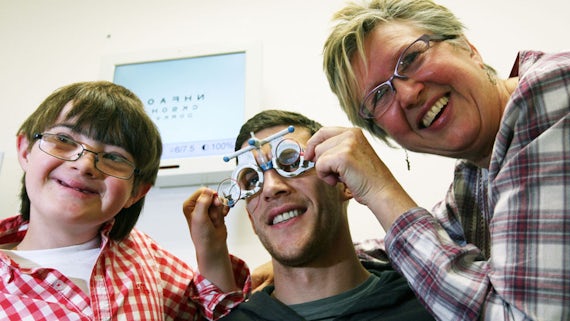About

Our 22 year study has gathered evidence on the vision of children and young adults with Down's syndrome and produced recommendations adopted in the UK and further afield.
This research unit has uncovered many ways in which visual development in Down's syndrome differs from that in typical children, and produced guidelines for the management and correction of visual problems in these children.
Overall, our study is dedicated to understanding:
- How and when eye defects arise.
- What makes children and adults with Down's syndrome more prone to eye defects.
- The impact of eye defects on learning and education and how these can be minimised.
- How we should best manage eye defects with spectacles or other interventions.
- How we might prevent eye defects in future generations of children.
We work with over 250 children and young adults
In 1992, Dr J Margaret Woodhouse of Cardiff University and Professor Bill Fraser of the University of Wales College of Medicine began recruiting our cohort of young children with Down's syndrome, with the aim of following the children's visual and general development.
Since then the cohort has grown, so that currently over 250 children and young adults take part in our studies. The children live in the areas of South and West Wales and beyond; with many families travelling long distances to take part in our studies. Some children have been with us since the beginning and we have had the privilege of watching them grow and develop into able young adults.
All of the families are precious to us and we remain grateful for their enthusiasm and commitment to our ongoing work.
...He took to the bifocals straight away and hasn't put his old glasses back on since wearing them. [He is] steadier on his feet, has better communication and attention when looking at flash cards and so on
Maggie's OBE
In June 2014, Dr J Margaret Woodhouse, or Maggie as she prefers to be known, was awarded an OBE for 'services to Optometry and services to people with disabilities'.
Although she has made contributions to eye care for children and adults with all forms of disabilities, it is for her work with children with Down's syndrome that she is best known and recognised.
Queen’s Anniversary Prize
In 2017 the Unit was awarded the UK’s most prestigious academic award - a Queen’s Anniversary Prize – for its pioneering research and treatment of vision problems in children with Down’s syndrome.
A 22 year study by our researchers gathered evidence on the vision of children and young adults with Down's syndrome and produced recommendations adopted in the UK and abroad.
